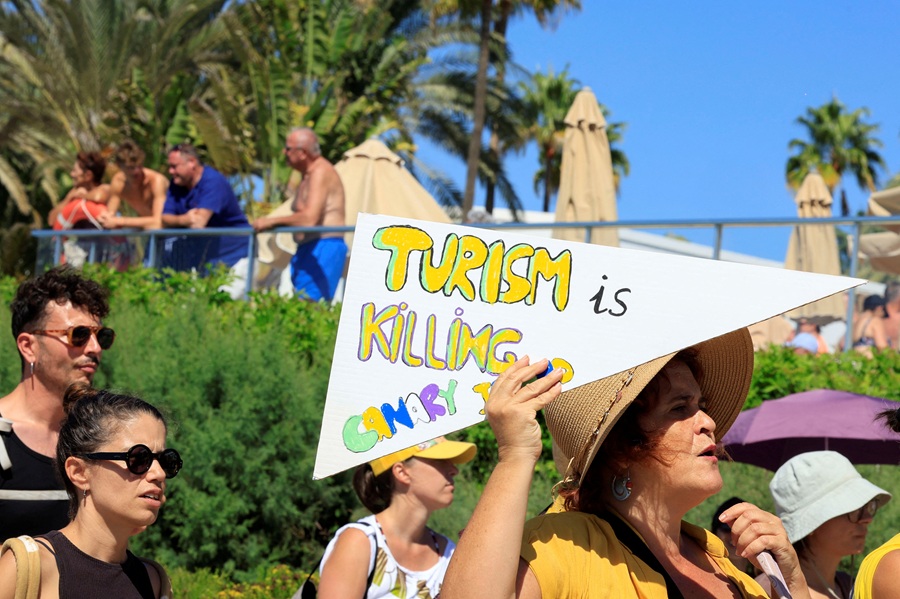On 18 May 2025, thousands of Canary Islands residents mobilized in peaceful yet powerful demonstrations to protest against the relentless surge of mass tourism and to demand enforceable visitor limits. Participants under the banner “Canarias tiene un límite” (“The Canary Islands have a limit”) called on local and national authorities to prioritize residents’ quality of life over ever-increasing tourist arrivals. Demonstrators highlighted acute issues including soaring housing costs, traffic gridlock, water scarcity, and overburdened healthcare and public services especially during peak season when over one million visitors arrive each month to an archipelago of just 2.2 million residents. The protests come amid record-breaking tourism numbers, with nearly 18 million tourist arrivals in 2024, intensifying pressures on infrastructure and natural resources. In response, the Spanish government has moved to shut down over 65,000 non-compliant Airbnb listings and regional officials have lobbied the EU for funding to build affordable housing, signaling a potential shift towards sustainable tourism management.
Background: Tourism in the Canary Islands
Since the 1970s, the Canary Islands have transformed from a modest vacation spot into one of Europe’s premier sun-and-sea destinations, tripling hotel capacity while generating substantial economic growth. In 2024, Spain recorded a historic 94 million tourists, with a significant share spent in the Canary archipelago, which in turn accounts for over 20% of the country’s foreign visitor volume. The economic model built around mass tourism has delivered jobs and revenue, but at the expense of housing affordability and environmental sustainability, fueling local resentment. Analyses by regional authorities warn that continued unchecked growth could exacerbate water shortages—already a critical issue on islands like Tenerife and Lanzarote—and further strain fragile ecosystems, including protected coastal areas and endemic flora and fauna.
Causes of the Protests
Housing and Rental Crisis
Residents report that short-term rental platforms, chiefly Airbnb, have driven up property values and rental rates, making it nearly impossible for young Canarians to find affordable homes. On the islands of Gran Canaria and Fuerteventura, rental prices have surged by 30–40% over the past three years, according to local housing associations, forcing many families to relocate to the mainland or to less accessible neighborhoods.
Overburdened Infrastructure
Public transport, road networks, and utilities operate at capacity during high season, leaving local commuters facing chronic delays and water rationing initiatives, especially in drier municipalities like Arrecife and Puerto del Rosario. Healthcare services too have reached breaking point, with hospital waiting times for residents increasing by 25% compared to pre-pandemic levels due to the extra burden of tourist healthcare needs.
Environmental Degradation
Environmental groups have sounded alarms over waste management shortfalls and damage to coastal habitats, notably in popular beach zones like Playa de las Canteras and Playa de Papagayo. The large-scale construction of hotels and holiday apartments has also led to irreversible landscape changes, undermining the islands’ natural appeal and biodiversity.
Key Demands and Slogans
Protesters rallied under various slogans, the most prominent being “Las Islas Canarias no se venden, se aman y se defienden” (“The Canary Islands are not for sale, they are loved and defended”) and “Turismo sí, masificación no” (“Tourism yes, overcrowding no”). Core demands included:
Legal caps on annual tourist arrivals per island, based on carrying-capacity studies.
Strict regulation of short-term rentals, with mandatory registration and local residency requirements for landlords.
Investment in public infrastructure to match tourist-induced demand spikes, covering transport, water systems, and healthcare.
Transparency and local input in tourism planning, ensuring that community voices shape development decisions.
Government and Industry Response
National Government Actions
In mid-May 2025, Spain’s Ministry of Consumer Affairs ordered Airbnb to remove over 65,000 listings contravening tourism regulations, marking one of the most significant short-term rental crackdowns in Europe. Madrid has also proposed legislation to limit the conversion of residential housing into tourist accommodations, subject to regional approval and EU consultation.
Regional Initiatives
Canary Islands authorities have petitioned the European Union for €200 million in urban development funds to finance affordable housing projects and upgrade water desalination plants. Officials are also exploring zoning reforms to redirect tourist accommodations to designated tourist hubs, preserving residential neighborhoods for local families.
Tourism Industry Measures
Some major tour operators, including TUI, have begun investing in staff housing to reduce their footprints on local housing markets and mitigate tensions with residents, following earlier protests in 2024. Sustainable tourism certifications, focusing on energy efficiency, waste reduction, and community engagement, are being promoted by industry associations to shift the narrative from growth at all costs to responsible travel.
Broader Implications and Comparisons
The Canary Islands protests echo similar movements in Mallorca, Barcelona, and Malaga, where residents have decried overtourism’s social and environmental tolls. In Mallorca, a 2018 ban on new hotel developments near sensitive natural parks set a precedent for balancing tourism with conservation. Barcelona’s planned 2028 ban on certain tourist rentals highlights a national trend towards tighter controls, reflecting a growing consensus that unbridled tourism growth threatens the very assets—cultural heritage and natural beauty—on which the industry depends.
Internationally, destinations like Venice and Dubrovnik have implemented entry quotas and tourist taxes, providing illustrative case studies for Canary Islands policymakers considering similar models.
Conclusion
The 18 May 2025 protests mark a critical juncture in the Canary Islands’ ongoing negotiation between economic benefits and social sustainability. By demanding enforceable limits, robust regulations, and genuine community participation, residents are not rejecting tourism outright but advocating for a recalibrated model that secures long-term prosperity without sacrificing quality of life. As Spain grapples with its record tourist influx, the Canary Islands’ movement may well serve as a blueprint for other regions striving to harmonize visitor appeal with the preservation of local identity and well-being.
